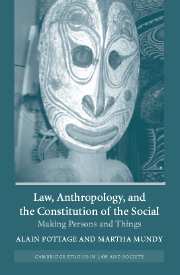Book contents
- Frontmatter
- Contents
- Notes on contributors
- 1 Introduction: the fabrication of persons and things
- 2 Res Religiosae: on the categories of religion and commerce in Roman law
- 3 Scientific objects and legal objectivity
- 4 Legal fabrications and the case of ‘cultural property’
- 5 Ownership or office? A debate in Islamic Hanafite jurisprudence over the nature of the military ‘fief’, from the Mamluks to the Ottomans
- 6 Gedik: a bundle of rights and obligations for Istanbul artisans and traders, 1750–1840
- 7 Losing (out on) intellectual resources
- 8 Re-visualising attachment: an anthropological perspective on persons and property forms
- 9 Our original inheritance
- Bibliography
- Index
7 - Losing (out on) intellectual resources
Published online by Cambridge University Press: 12 July 2009
- Frontmatter
- Contents
- Notes on contributors
- 1 Introduction: the fabrication of persons and things
- 2 Res Religiosae: on the categories of religion and commerce in Roman law
- 3 Scientific objects and legal objectivity
- 4 Legal fabrications and the case of ‘cultural property’
- 5 Ownership or office? A debate in Islamic Hanafite jurisprudence over the nature of the military ‘fief’, from the Mamluks to the Ottomans
- 6 Gedik: a bundle of rights and obligations for Istanbul artisans and traders, 1750–1840
- 7 Losing (out on) intellectual resources
- 8 Re-visualising attachment: an anthropological perspective on persons and property forms
- 9 Our original inheritance
- Bibliography
- Index
Summary
‘Living men or women should not be allowed to be dealt with as [a] part of compensation payment under any circumstances.’ The custom is ‘repugnant to the general principles of humanity’. Thus said Judge Salamo Injia in handing down his verdict on (as it caught the local headlines) the ‘Compo girl case’. This was at the Mount Hagen National Court in 1997; it concerned people from the Minj part of the Wahgi region, in the Western Highlands of Papua New Guinea.
The case offers an interesting comment on the role played by legal technique in the fabrication of persons and things. In some respects it rehearses issues which have long troubled anthropologists describing marriage arrangements. They include the extent to which an equation between women and wealth renders women ‘thing’-like, the locus classicus being bride-wealth (bride-price) payments, which feeds an epistemological anxiety, the extent to which anthropological analysis in turn treats its subjects as less than subjects, where the locus classicus is ‘the exchange of women’. With these issues in the background, I note the role played in this case by the reference to human rights. That role assisted in the fabrication of persons; the antithesis between persons and things was never far away.
This is an instance where it might assist analysis to project a distinction of sorts between person and thing onto the Papua New Guinean material, although the techniques of fabrication will be of a politico-ritual rather legal nature, and the distinction does not work quite as Euro-Americans might expect.
- Type
- Chapter
- Information
- Law, Anthropology, and the Constitution of the SocialMaking Persons and Things, pp. 201 - 233Publisher: Cambridge University PressPrint publication year: 2004
- 29
- Cited by



